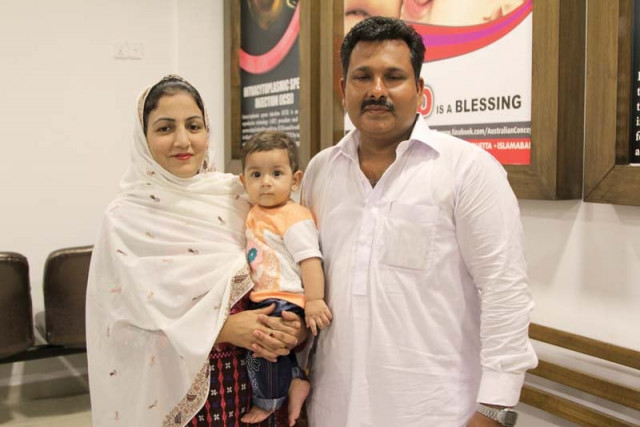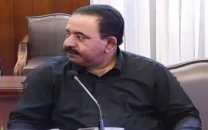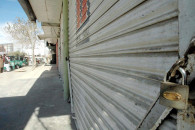Fertility clinic helps bring home your little bundle of joy
Experts say 15% of all couples in Pakistan need fertility treatment

After 12 years of marriage, Mazhar and Uzma were blessed with a baby girl after receiving treatment at the ACIMC. PHOTO: AYSHA SALEEM/EXPRESS
"I could not conceive as my tubes were blocked. We were very disappointed," Uzma told The Express Tribune. "But, one-and-a-half-year ago, we came across an advertisement of the Australian Concept of Infertility Medical Centre (ACIMC) on television and visited their clinic."
However, Uzma did not face the 'humiliation' that a woman has to for not being able to produce a baby after 12 years of marriage - but Tahira Shah did.
Tahira, 40, her husband Sanober Shah, 48, were mocked and ridiculed at family gatherings for not having children. The couple was blessed with a baby girl, Ambreen, eight years ago. "We tied the knot in 1994 but I failed to conceive," Tahira said. "Although I went for treatment at a number of places, including religious faith healing sessions, nothing worked for us." Sanober said his friend, who runs a medical store, told him about ACIMC. "I contacted them and soon we were blessed with a baby girl. "Whenever I pass by this area (where the centre is located) I pray for its success."
ACIMC Chief Executive Officer Dr Syed Sajjad Hussain said, "A large number of women who come to us for treatment tell us they are ridiculed by their family members and relatives."
Not a disease
Dr Hussain said infertility is a symptom, not a disease. According to the World Health Organization, infertility is the inability of a sexually active, non-contracepting couple to achieve pregnancy in one year.
Dr Hussain maintained that before the advent of in vitro fertilisation (IVF) technology, it was assumed that only the female is responsible. Both male or female factors can be involved in infertility and the reasons of infertility can be unexplained too, he added. "Earlier the focus was on the female and it was much later that we found out that the male has equal chances of being the cause of infertility. In the 1980s, male factors started to come to surface and the IVF technology was introduced. According to our data, we are treating almost 60% male infertility."
Ways out
He added that in 1976, a major breakthrough came in medical sciences when making fertile female eggs outside the human body became possible. The first baby was born through this technique in 1978 was Louis Brown. Since then, over six million couples have been blessed with children across the world, he added. "Around 10,000 children have been born in Pakistan through IVF."
Among the issues of women's irregular periods, small ovaries and blocked tubes, endometriosis, cyst, congenital abnormalities, hormonal imbalance, pelvic infection and polyps are factors that cause infertility, he said, adding that among men weak sperms cause infertility.
"Almost 15% couples are facing infertility problems and around 400,000 couples in Pakistan need treatment," he claimed.
A gynaecologist and infertility expert at Aga Khan University Hospital, Dr Sumaira Naz, said that the ratio of infertility related issues is increasing by the day in Pakistan. "One in six women is facing infertility problems," she said, adding that these problems can be treated. "If a woman is diagnosed with a blocked tube she doesn't have any other option but to go for IVF treatment."
Considering the pocket
Tahira and her husband Sanober could not afford the treatment and the medical centre helped them. "I work in a factory and could not afford this treatment," Sanober said. "Nine years ago, I spent Rs50,000 on the entire treatment and Dr Hussain helped us financially."
Dr Hussain said, "Our centre is not total charity. We rarely offer 100% financial support since we have limited resources. We chip in money and also involve patients."
Through this treatment, the couple can choose the sex of the baby too. "Some couples don't bother about sex and they just want children," he said, adding that, "If asked, most couples prefer boys over girls."
Fertility centre
ACIMC was established in 1998 in Clifton, Karachi and it is at the forefront of fertility treatment technology.
Published in The Express Tribune, August 16th, 2016.



















COMMENTS
Comments are moderated and generally will be posted if they are on-topic and not abusive.
For more information, please see our Comments FAQ